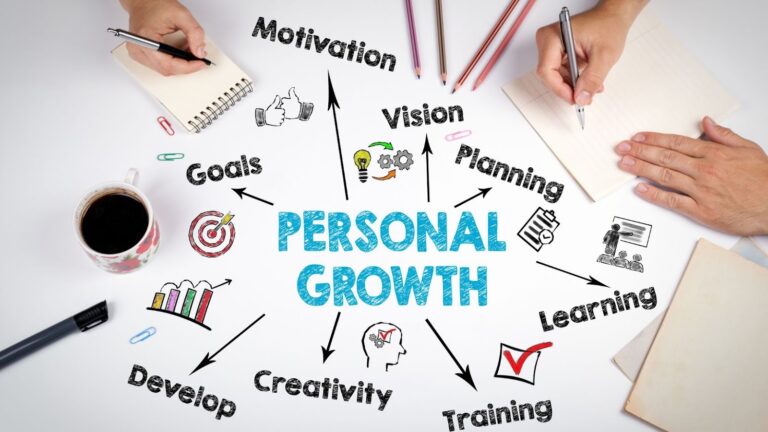
Top Personal Development Online Courses for Achieving Your Goals
In today’s fast-paced world, personal development online courses have become essential tools for individuals seeking growth and self-improvement. These flexible programs offer the chance to enhance skills, boost confidence, and achieve personal goals—all from the comfort of home.
With a wide range of topics available, from time management to emotional intelligence, online courses cater to diverse needs and learning styles. Whether aiming to advance in a career or simply pursue personal interests, investing in personal development can lead to meaningful and lasting change.
Understanding Personal Development Online Courses
Personal development online courses enhance individuals’ skills, knowledge, and personal growth through structured modules delivered via digital platforms. These courses include interactive lessons, assessments, and practical exercises that facilitate learning and application of concepts.
Key Components
- Curriculum Design: Structured content covering various personal development topics.
- Interactive Learning: Engaging activities such as quizzes, discussions, and assignments.
- Flexible Scheduling: Self-paced modules allowing learners to progress at their convenience.
- Certification: Official recognition upon course completion, validating acquired skills.
Benefits
- Accessibility: Available to anyone with internet access, eliminating geographical barriers.
- Affordability: Lower costs compared to in-person training programs.
- Variety: A wide range of subjects catering to diverse interests and career goals.
- Customization: Personalized learning paths tailored to individual needs and preferences.
- Time Management
- Emotional Intelligence
- Leadership Skills
- Effective Communication
- Stress Management
Benefits of Personal Development Online Courses

Personal development online courses offer numerous advantages that support individual growth and learning. These benefits make them a preferred choice for many seeking self-improvement.
Flexibility and Accessibility
Flexibility and accessibility allow learners to engage with course materials on their own schedule, if they need to balance work or personal commitments. Online platforms provide asynchronous modules, enabling access anytime, anywhere. They accommodate various learning styles through video lectures, interactive quizzes, and downloadable resources. Additionally, global availability removes geographical limitations, facilitating participation from diverse locations.
Cost-Effectiveness
Cost-effectiveness ensures that personal development courses are affordable for a wide audience, provided they are compared to traditional in-person workshops. Online courses typically require lower tuition fees, eliminating expenses related to travel, accommodation, and printed materials. Many platforms offer tiered pricing or subscription models, presenting budget-friendly options. Additionally, promoting these courses through printable flyers can help reach a broader audience and increase accessibility. Furthermore, free courses are available, granting access to valuable content without financial investment.
Key Features to Look For
When selecting personal development online courses, identifying essential features ensures effective learning and achievement of personal goals. The following aspects enhance the overall quality and impact of the courses.
Comprehensive Curriculum
A comprehensive curriculum covers relevant topics and structured modules, facilitating thorough understanding. It includes specific subjects such as time management, emotional intelligence, leadership skills, effective communication, and stress management. Courses with a well-rounded curriculum ensure that learners receive balanced and in-depth knowledge across various personal development areas.
Qualified Instructors
Qualified instructors possess expertise and credentials in their respective fields, providing credible and reliable instruction. They offer practical insights and evidence-based strategies, enhancing the learning experience. Courses led by experienced professionals ensure that the content is accurate, up-to-date, and applicable to real-world scenarios.
Interactive Learning Tools
Interactive learning tools engage learners and reinforce understanding through active participation. Features such as video lectures, quizzes, discussion forums, and practical exercises facilitate diverse learning styles. Courses that incorporate these tools promote better retention, application of knowledge, and a more dynamic educational experience.
Popular Types of Personal Development Courses
Personal development online courses offer diverse options to enhance various skills. These courses cater to different interests and professional needs.
Leadership and Management
Leadership and management courses focus on developing effective leadership skills and managerial techniques. They cover topics such as strategic planning, team building, and conflict resolution. Participants learn to lead teams efficiently, make informed decisions, and drive organizational success. Examples include courses on transformational leadership, project management, and executive coaching.
Time Management and Productivity
Time management and productivity courses teach techniques to optimize time usage and increase efficiency. They include modules on goal setting, prioritization, and task delegation. Learners acquire strategies to reduce procrastination, manage workloads effectively, and achieve work-life balance. Popular courses address topics like the Pomodoro Technique, Eisenhower Matrix, and productivity software tools.
Mindfulness and Well-being
Mindfulness and well-being courses promote mental health and personal balance. These courses offer training in meditation, stress reduction, and emotional regulation. They help individuals enhance focus, resilience, and overall well-being. Common offerings include mindfulness-based stress reduction (MBSR), yoga practices, and courses on building emotional intelligence.
How to Choose the Right Personal Development Online Course
Selecting the appropriate personal development online course involves several strategic steps to ensure alignment with individual goals and learning preferences.
1. Define Clear Objectives
Identify specific personal growth goals, such as improving time management, enhancing leadership skills, or increasing emotional intelligence. Clear objectives guide the selection process and ensure the course content meets desired outcomes.
2. Evaluate Course Content and Curriculum
Examine the course syllabus to ensure it covers relevant topics comprehensively. Look for structured modules, practical exercises, and up-to-date material that align with current industry standards and personal development trends.
3. Assess Instructor Qualifications
Verify the instructors’ credentials, including their educational background, professional experience, and expertise in personal development. Qualified instructors provide credible instruction and valuable insights based on real-world applications.
4. Consider Learning Format and Delivery
Determine the course format that best suits learning preferences, such as video lectures, interactive quizzes, or downloadable resources. Flexible delivery options, including asynchronous modules, accommodate varying schedules and learning styles.
5. Check Flexibility and Scheduling
Opt for courses that offer flexible scheduling options, allowing learners to progress at their own pace. Courses with lifetime access or extended time frames provide the necessary adaptability for busy individuals.
6. Review Cost and Value
Compare tuition fees, subscription models, and available payment plans. Assess the value offered, including access to exclusive content, certification upon completion, and additional resources like community forums or one-on-one coaching.
7. Read Reviews and Testimonials
Analyze feedback from previous participants to gauge course effectiveness and satisfaction. Positive reviews and high ratings indicate a reputable program that delivers on its promises.
8. Verify Certification and Accreditation
Ensure the course offers recognized certification upon completion, which can enhance professional credibility. Accredited programs meet established quality standards and are often more valued by employers and institutions.
9. Explore Support and Resources
Evaluate the level of support provided, including access to instructors, mentorship opportunities, and technical assistance. Comprehensive support systems facilitate a smoother learning experience and better knowledge retention.
10. Test with Free Trials or Samples
Take advantage of free trials, sample lessons, or introductory modules to assess the course quality and teaching style. Hands-on experience helps determine if the course aligns with personal learning preferences and expectations.
By systematically considering these factors, individuals can effectively select personal development online courses that foster meaningful growth and achieve their specific personal and professional goals.
Tips for Success in Personal Development Courses
Set Specific Goals
Define clear, measurable objectives before starting a course. Establishing precise targets enhances focus and motivation, enabling learners to track progress effectively.
Create a Consistent Schedule
Allocate dedicated time blocks each week for course activities. Consistent study routines promote steady advancement and prevent procrastination.
Engage Actively with Course Materials
Participate in all interactive elements, such as quizzes and discussion forums. Active engagement reinforces understanding and retention of information.
Utilize Available Resources
Take advantage of supplementary materials like e-books, videos, and downloadable resources. These tools provide additional perspectives and support comprehensive learning.
Monitor Progress Regularly
Use tracking tools to assess completed modules and achieved milestones. Regular monitoring identifies areas needing improvement and celebrates achievements.
Seek Feedback and Support
Interact with instructors and peers to gain constructive feedback. Collaborative learning environments foster deeper comprehension and problem-solving skills.
Apply Learned Skills Practically
Implement course concepts in real-life scenarios to solidify knowledge. Practical application bridges the gap between theory and practice, enhancing skill mastery.
Stay Motivated and Persistent
Maintain a positive mindset and stay committed to course completion. Persistence ensures overcoming challenges and achieving personal development goals.
Manage Time Effectively
Prioritize tasks and avoid distractions to maximize study efficiency. Effective time management leads to productive learning sessions and better outcomes.
Reflect on Learning Experiences
Regularly evaluate what has been learned and its impact on personal growth. Reflection encourages continuous improvement and meaningful development.
Leverage Technology Tools
Use digital planners, note-taking apps, and productivity software to organize study activities. Technology aids in maintaining structure and optimizing the learning process.
Maintain a Healthy Work-Life Balance
Balance course commitments with personal and professional responsibilities. A healthy equilibrium supports overall well-being and sustained academic performance.
Stay Updated with Course Updates
Keep track of any changes or additional materials provided by the course. Staying informed ensures access to the latest information and resources.
Participate in Networking Opportunities
Connect with fellow learners and professionals in the field. Networking expands knowledge, offers new perspectives, and creates potential collaborations.
Celebrate Milestones Achieved
Acknowledge and reward progress made throughout the course. Celebrating milestones boosts morale and encourages continued effort toward goals.
Adapt Learning Strategies as Needed
Adjust study methods based on effectiveness and personal preferences. Flexibility in learning approaches enhances overall course performance and satisfaction.
Maintain Discipline and Self-Motivation
Cultivate self-discipline to stay on track without external enforcement. Self-motivation drives continuous engagement and commitment to personal development.
Utilize Feedback for Improvement
Incorporate feedback from assessments and reviews to refine skills. Constructive criticism facilitates growth and enhances learning outcomes.
Stay Curious and Open-Minded
Embrace new ideas and perspectives introduced in the course. Curiosity fosters a deeper understanding and enriches the personal development journey.
Prioritize Self-Care
Ensure adequate rest, nutrition, and exercise to support cognitive functions. Self-care activities improve focus, energy levels, and overall academic performance.
Evaluate Course Relevance to Goals
Regularly assess how course content aligns with personal objectives. Ensuring relevance maintains motivation and reinforces the value of the learning experience.
| Tip | Description |
|---|---|
| Set Specific Goals | Define clear, measurable objectives to enhance focus and track progress. |
| Create a Consistent Schedule | Allocate dedicated time blocks each week to promote steady advancement. |
| Engage Actively | Participate in quizzes and forums to reinforce understanding and retention. |
| Utilize Available Resources | Use e-books, videos, and downloads for comprehensive learning support. |
| Monitor Progress | Assess completed modules and milestones to identify improvement areas and celebrate achievements. |
| Seek Feedback and Support | Interact with instructors and peers for constructive feedback and collaborative learning. |
| Apply Learned Skills | Implement course concepts in real-life scenarios to solidify knowledge. |
| Stay Motivated | Maintain a positive mindset and commitment to overcome challenges and achieve goals. |
| Manage Time Effectively | Prioritize tasks and minimize distractions to maximize study efficiency. |
| Reflect on Learning | Evaluate learned material and its impact on personal growth for continuous improvement. |
Conclusion
Personal development online courses open doors to endless growth opportunities. They provide the flexibility to learn at one’s own pace and the affordability to pursue continuous improvement. By selecting courses that align with their goals, individuals can tailor their learning experiences to enhance specific skills and knowledge areas.
Engaging with these courses encourages a proactive approach to self-improvement and fosters lasting changes. With dedication and the right resources, learners can achieve meaningful transformations in both personal and professional aspects of their lives. Investing in online personal development is a step toward unlocking full potential and navigating life’s challenges with confidence.







